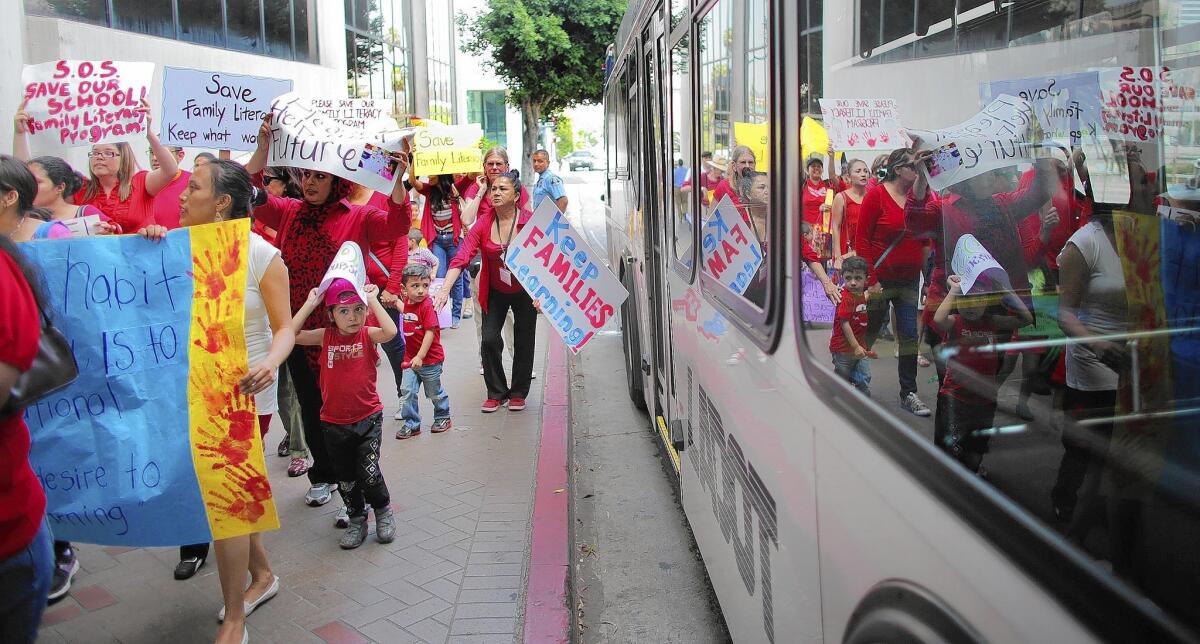L.A. literacy program unites families, boosts kids’ reading skills

- Share via
It’s bath, book and bed for 5-year-old Nathan Flores. No TV. His parents learned the importance of routine and reading when they began taking him to a local family literacy program two years ago.
Now, a sibling is on the way. Leslie Flores, Nathan’s mother, said the program would be great for the whole family. “If they’re still around, I’ll definitely be taking my baby there,” she said.
Whether the program that Flores knows is still around, however, remains to be seen. Grants for it have expired. The Los Angeles Unified School District plans to foot the bill for the Family Literacy Project but is proposing some cuts in an effort to keep it sustainable. This year, it’s expected to serve 144 families, many of which are low-income and learning English, compared with 200 last year.
In a district that enrolls about 650,000 students, the program is tiny but its supporters are passionate. They rallied in May when they feared the program would end when the grants expired. Supt. John Deasy in June said he would find $500,000 in the district’s budget to support the program for one year. Funding previously came from the Toyota Foundation and First 5 Los Angeles.
“This is one of the most effective programs I have ever seen,” school board member Steve Zimmer said in a June statement. “Engaging parents and young children simultaneously has proven effective in both lifting and stabilizing families.”
Some of the program’s advocates, however, express concerns over potential changes.
“It seems at best a detour, and at worst a bridge to nowhere.… It would be a watered-down version of the program that would not allow us to produce exemplary results,” said Patricia Bauer, a program volunteer.
The district’s proposal includes the elimination of program coordinators and infant care aides. Currently, there is funding for programs at five locations and the district continues to seek a grant to support a sixth. The proposal does not include field trips, as it had in the past, but L.A. Unified officials said trips are generally low cost or free and won’t be affected.
Program coordinators say that the class structure will be the same under the proposal, and that there are some additions. They hope to improve service by adding certified early education aides and teachers. Their goal is to maintain a ratio of eight students to one instructor.
“We’re not getting the same budget to run what we used to run,” said Donna Brashear, L.A. Unified’s early childhood education executive director. “We’re trying to offer the best program we have with the budget we have.”
The program, which has operated for nearly 20 years, brings families together for reading lessons, adult education opportunities and parenting techniques. The program aims to provide parents with the skills and knowledge to be successful at school, work and home.
“There’s a saying that if a mother builds her literacy, it builds the literacy of the whole family,” said Sharon Polkinghorn, who has been the Shenandoah Street Elementary School coordinator for six years. She added that families welcome the chance to be together.
“In a big family or a small apartment, they may not have the chance to have that parent-child one-on-one time.”
Polkinghorn said one of the most satisfying outcomes is the relationships built among the families, which have different cultural and religious backgrounds, coming from such countries as Mexico and Egypt.
“Everyone brings their culture to the table, and it’s so uniting. There’s nothing that’s as bonding as mothers talking about their children.… They create a social network [and] they really help each other out. That helps everyone out,” Polkinghorn said.
The camaraderie has been a safety blanket for Flores, Nathan’s mother. Also important, though, has been Nathan’s reading skills. “He’s reading books to me,” she said, “and he’s not even in kinder yet.”
Twitter: @haydensaraa
More to Read
Sign up for Essential California
The most important California stories and recommendations in your inbox every morning.
You may occasionally receive promotional content from the Los Angeles Times.













